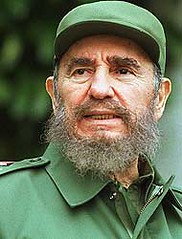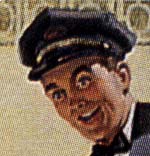Fidel Castro Dead at 79

Times Wire
HAVANA, Cuba- Fidel Alejandro Castro Ruz, president of Cuba, died today of complications from colon cancer, according to official Cuban sources. His death followed intense speculation in the U.S., particularly the Cuban exile community in Miami, that Mr. Castro was undergoing surgery for life-threatening intestinal bleeding. Prior to the surgery, Castro temporarily handed power over to his brother, Raúl--the first time he has given up power since becoming prime minister of the island in 1959. Today, that temporary power became permanent, with Raúl Castro becoming Cuba's first new president in 47 years.
Mr. Castro's communist dictatorship lasted decades, surviving a U.S. backed invasion, a superpower missile crisis, numerous assassination plots and nearly a half century of U.S. economic sanctions.
Born in 1926, Fidel Castro Ruz was the son of an immigrant landowner from Spain who owned large estates in the eastern part of the island. As a youth, Fidel attended Jesuit schools, and then later enrolled at the University of Havana, where he received a law degree and also became active in politics.
A powerful and charismatic speaker, he soon emerged as one of the leaders in the growing movement against the dictatorship of Fulgencio Batista. In 1953, one year after Mr. Batista seized power in a bloodless coup, Mr. Castro led an unsuccessful attack to seize the Moncada military barracks in Santiago de Cuba, the island's second largest city. A number of his men were killed, and many others captured, including Mr. Castro himself.
After his release in 1955, Mr. Castro began organizing another effort to overthrow the Batista dictatorship. This time, he was more successful. By the late 1950's, he was leading a large guerilla force based in Cuba's Sierra Maestra mountains. Victory finally came in January, 1959, and a triumphant guerilla army, many of them bearded and wearing fatigues, marched into Havana.
After seizing power, the new Cuban government began making major changes, collectivizing farms and nationalizing banks and industries, including more than $1 billion worth of U.S. properties. Political liberties were suspended and government critics jailed.
In taking these actions, Mr. Castro finally acknowledged what had become increasingly obvious; he was a marxist and intended to set up a communist state in Cuba. Cuba's new leader also made sure that he would keep a tight rein on power. According to Cuba specialist, Thomas Patterson:
"From the very beginning, beginning in the late '50s when he rebelled against Batista, he tried to keep power and authority very much in his own hands for himself and a very small circle of friends. It's his revolution in that sense, and we speak of the Castro Revolution, not just the Cuban Revolution."
Mr. Castro's policies put him on a collision course with the United States. Washington broke off diplomatic relations with Havana, and imposed a trade embargo. Then, in April, 1961, the United States armed and directed a poorly planned invasion by Cuban exiles, which was easily defeated at the Bay of Pigs. Another confrontation occured in 1962, when the United States discovered Soviet nuclear missiles had been installed on the island. Moscow withdrew its missiles after U.S. naval forces set up a blockade of the island, thereby ending the most dangerous showdown of the Cold War.
Following the Cuban missile crisis, Mr. Castro built up his armed forces into one of the most powerful in Latin America. Sometimes acting as a Soviet proxy, Mr. Castro sent his troops around the globe to support the spread of communism. Also in the 1960s and '70s, he supported leftist guerilla movements in Latin America. At the same time, Mr. Castro established a healthcare and education system that put Cuba among the top nations of the developing world for high literacy rates and low infant mortality. These programs succeeded in part because of financial support from Moscow. By the time the Soviet Union collapsed in the early 1990s, Cuba had been receiving up to $6 billion a year in Soviet subsidies.
The disappearance of these subsidies plunged Cuba into a deep recession that led to severe shortages of food and other necessities. This forced the communist government to undertake some reforms, such as allowing limited private sector activities, legalizing the use of the dollar, and seeking foreign investment. But even these small steps towards a free market system were resisted by the aging Cuban leader.
"Even rich industrial countries", he told reporters on more than one occasion, "cannot put all their people to work. This is why capitalism is unsustainable."
But his brand of socialism also proved unworkable. By the end of the 1990's, only Cubans with dollars could buy good quality food, medicines or other necessities. Mr. Castro blamed this situation on the U.S. economic embargo, and while many Cubans may have agreed with him, they also blamed the failings of communism for the country's economic problems.
Mr. Castro never ceased his opposition to capitalism or to the way the world had changed following the collapse of communism in eastern Europe and Russia. At the time of his death, he had held power longer than any current Latin American leader.
The Bush administration's reaction to the news of Castro's death was decidely mixed, saying no change in U.S. policy on Cuba is forthcoming. At a briefing at the White House, spokesman Tony Snow said the change in power won't mean any changes in the U.S.-Cuba relationship, at the moment.
''There are no plans to reach out,'' Snow said.
He said the president is committed to democracy in Cuba and called Castro's brother his ''prison keeper'' and that Raul Castro's elevation to Cuban president will "not a change that status.''
''The one thing we're going to continue to do is assure the people of Cuba that we stand ready to help,'' Snow said, referencing the report that spells out how the administration will handle a post-Castro Cuba.
The State Department reiterated its longstanding policy that the United States would only act if a transition government moved toward democracy.
The Real Fidel Castro




0 Comments:
Post a Comment
<< Home